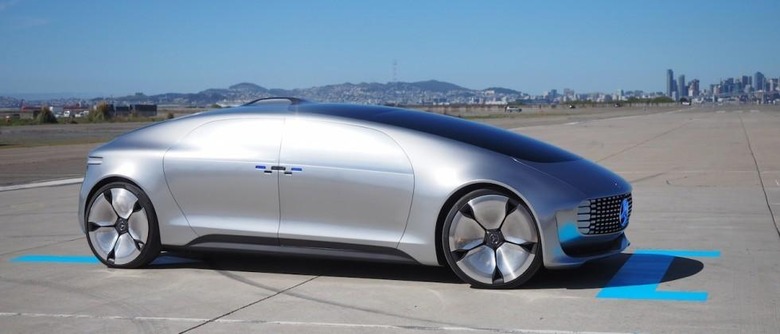Baidu: 'Modest' City Changes Needed For Self-Driving Future
Self-driving cars are the future, and humans have to learn to deal with that. There's the need to accept that we won't always be behind the wheel, of course, but it's more than that — autonomous cars will one day drive as well as humans, but they will also drive differently, and that means both humans and the cities we construct must shift accordingly. Such is the argument recently put forth by Andrew Ng, chief scientist at Chinese company Baidu.
Baidu is referred to by some as the "Google of China," and we've known for a while now that the company is working on its own self-driving car. Just recently, it was announced that Baidu's self-driving car will soon be tested on U.S. roads, but that's just the start of things. The company is fully dedicated to getting our autonomous future up and running, and it is pushing for both humans and cities to get onboard now.
As reported by the Wall Street Journal on Wednesday, Mr. Ng was one of many from the industry who testified before the U.S. Senate Commerce Committee. For his part, Ng called on governments around the world to make small but necessary tweaks to city infrastructure, better enabling self-driving cars to operate, and operate well.
I still trust autonomous cars more than I trust you
This week, Ng published a report in which he elaborated on what he means, and he brings up some good points. He frames his argument using trains as an example — everyone is familiar with trains, but there was a time when they were new and humans were still figuring out how to best deal with them. We've developed small but significant infrastructure changes, such as railway warning signs on roads and railway crossings with protective barriers; we've also tweaked human behavior, learning to avoid tracks and give trains ample space.
In due time, humans will do the same thing for autonomous cars, but it may be a bit more tricky if cities and residents don't all get onboard and make a dedicated effort. We've been driving cars ourselves for a long while, and it'll be our natural inclination to treat autonomous vehicles as if they have a human driver — something we certainly can't do, as there are fundamental differences between how a smart vehicle and a human perceive and understand the world.

Says Ng, cities are in need of "modest changes to infrastructure" to support a safe and more effective autonomous future. One example is the use of wireless beacons at construction sites rather than humans with signs and hand signals. A human may know an outstretched palm means to stop, for example, but a self-driving car may ignore it altogether. Using a beacon, the cars would be informed of the situation in a way they understand and given details on when to stop and when to go.
Other examples are things like having multiple traffic signals at certain intersections to ensure that at least one is always visible — we've all had to deal with traffic lights that were hard to see due to a glaring sun. Autonomous cars would suffer greatly in these situations, as their cameras would be blinded.
Ng goes on to argue that self-driving cars need to be predicable, as much for their own good as for humans. Predictability doesn't necessarily mean familiarity, though — it is important to remember that such cars will operate in distinctively different ways than humans.
A simple way to make self-driving cars more predictable is to first make them easy to spot — if you can't tell the difference between an autonomous car and a human-operated car, you may have trouble anticipating how that particular vehicle is going to act. Baidu, for its part, has made its car half red and half white — says Ng, this is like "having a big 'Student Driver' sign on a car." Other necessities include making sure road markings are always clear (no faded lines, for example) and that roads are well-maintained.
Why the push for making city adjustments as soon as possible when self-driving cars are still years away?
Says Ng:
Car crashes kill more than 3,000 people a day. Autonomous cars will affordably reduce this grim death toll. We have a moral imperative to urgently bring them to fruition. Each day's delay is another 3,000 deaths, another 3,000 families getting that dreaded phone call.
